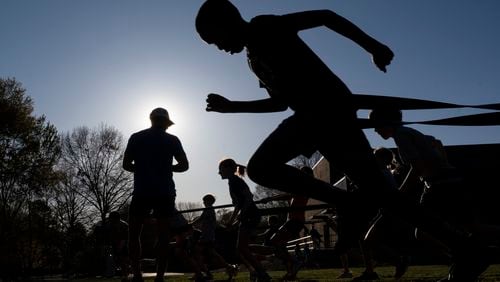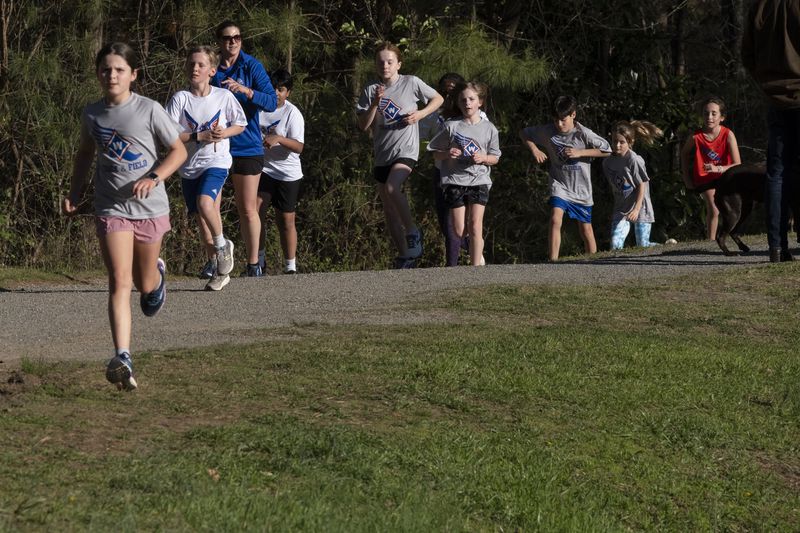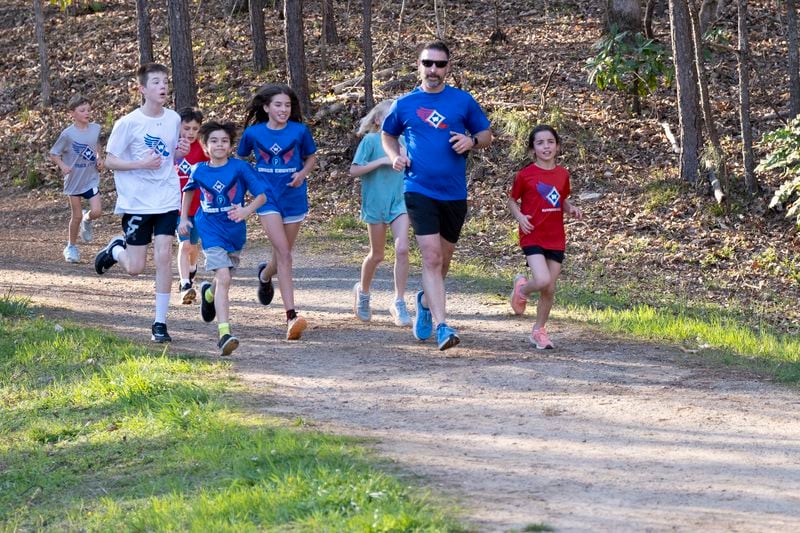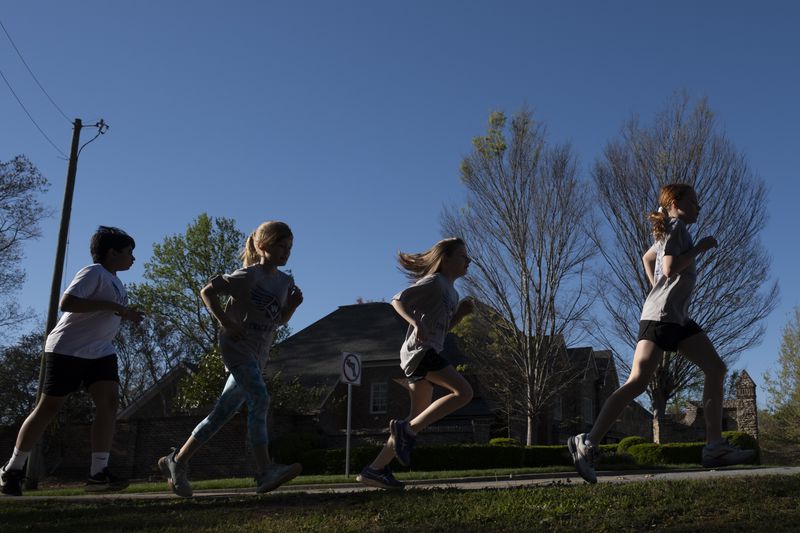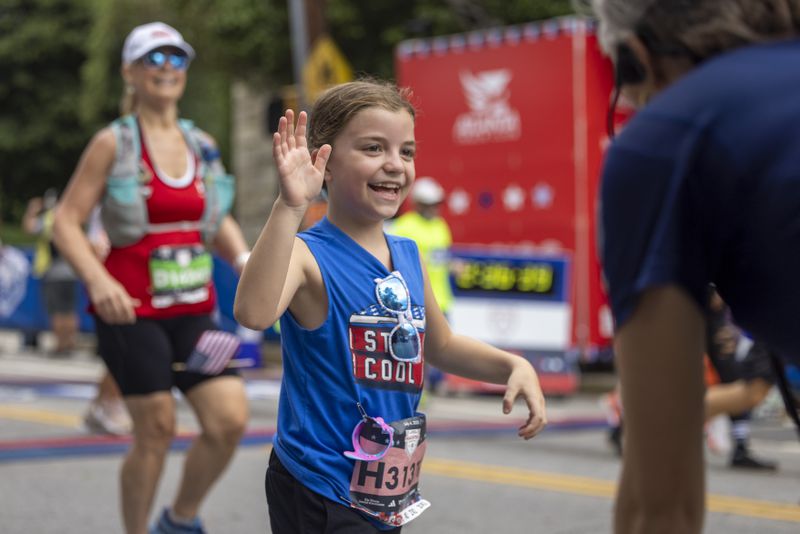If your child wants to run in the AJC Peachtree Road Race — or if you want your child to run the Peachtree — coaches advise you to approach the idea gently and let your kid lead.
While running offers tremendous benefits for children, parents may be unsure at what age can a child train for and run a race. And how safe is it for young children to run fast, far and often?
The minimum age is 10 for runners in the 6.2-mile Peachtree Road Race. But many other, shorter races are organized by Atlanta Track Club, including the mile-long Peachtree Junior race, cater to children as young as 6. There’s even a 50-meter dash course open to the youngest kids.
For the first time this year, the junior race — the Microsoft Peachtree Junior — will be free to enter, thanks to a sponsorship by the software giant.
On a recent afternoon at Sope Creek Elementary School in Cobb County, dozens of children as young as 7 enthusiastically hit the pavement for a training run, despite a drizzling rain. Some of the young runners sprinted, while others took on a longer route up hills in a tree-lined neighborhood near the school.
Many either have already run the full Peachtree or plan to in the future.
Credit: Ben Gray
Credit: Ben Gray
One of them was Finn Timmons, now 12, who last year won his age group for boys 10 to 14 years in the Peachtree. A member of the running group for three years, he completed the 10K course in just under 38 minutes at 37:54.
“I like running because it lets you think about what’s on your mind and anything really,” he said after finishing his run, sporting his 2023 Peachtree T-shirt. “After you run, you feel free and your mind sort of resets.
Claire Weldin, who is 13, joined the running group three years ago. She says running is a great stress reliever and she’s made a lot of friends in the group. She said she is “super excited” to run the Peachtree for the first time in July.
She is working toward a goal of a 6-minute mile, but said mostly she’s looking forward to experiencing the special event she’s heard so much about.
Meanwhile, Emma Shealy, who is also 9 and part of the running group, said running makes her feel good and gives her a sense of accomplishment. She is looking forward to running the Peachtree next summer.
“I think kids running races, be it the Peachtree or the Peachtree Jr., I think all of that is great,” Dr. Ashley Brouillette, a pediatric sports medicine physician at Children’s Healthcare of Atlanta, who specializes in the diagnosis and treatment of sports-related injuries. “I think making it fun is really important.”
Physical activity is essential for a child’s growth and development and their overall wellbeing. Running provides opportunities to boost one’s mood, socialize, and accomplish new goals, according to she said.
But don’t force it.
Here are some top tips from Adam Johnson, head coach of the Walton Youth Running Club in east Cobb and Brouillette of Children’s Healthcare of Atlanta on running and running the Peachtree.
Focus on fun, not structure
Children can safely run at any age, Brouillette said, and she recommends children 6 and under start in a way that is presented as fun and not overly structured.
Johnson noted they they incorporate games — such as Red Light, Green Light, and Sharks and Minnows — into running exercises for younger kids.
“There’s nothing kids hate more than running past a bunch of mailboxes in the neighborhood,” said Johnson said.
Credit: Ben Gray
Credit: Ben Gray
Don’t start races too young
Children as young as 7 can run in an organized way, and can train gradually for longer distances, but the key is the child should be showing their own enthusiasm and motivation before they participate in a race, according to Brouillette.
For children training for an upcoming race, Nationwide Children’s Hospital recommends a maximum running distance no more than twice the competition distance in any given week.
But some experts, including Brouillette, don’t believe it’s always so clear-cut, saying a child’s physical development, training and desire to run can matter more than their age.
“Certainly, should a 6-year-old be running a half marathon? No,” said Brouillette. “But might there be some 10-year-olds, 11-year-olds who might be able to? Maybe.”
Start slow and increase distance gradually
Children new to running should start with running one or two times a week in a low-pressure running activity, Brouillette said.
Johnson said his beginners will run 1.5 to 2 miles, and the more experienced runners in the group run 6 to 7 miles in a practice.
Whether your child is new to running, an elite runner or coming back from an injury, the same rule applies: they should not increase their mileage by more than 10% each week, Brouillette said.
REGISTRATION IS NOW OPEN! Join us at the AJC Peachtree Road Race, the party of the summer, right here in Atlanta on July 4th. 🍑
— AJC Peachtree Road Race (@ajcprr) March 15, 2024
No matter how you move to the finish line, we can't wait to celebrate at the world's largest 10K! Register at https://t.co/zElNkES4mr. pic.twitter.com/dp02iBApIh
Easy does it
Overtraining can lead to overuse injuries. Among common injuries in new runners are “shin splints” which is pain along the bone in the lower leg that may accompany longer or harder training, and can progress to stress fractures.
Another common overuse condition known as Osgood-Schlatter disease can cause pain and swelling below the knee in growing children and adolescents.
To prevent injury, children should space out their hard runs, taking an easier day in between harder or longer efforts, and stretch before and after runs.
Credit: Ben Gray
Credit: Ben Gray
Strength exercises are key for injury prevention
Strength exercises, including building core and back strength as well as strengthening hip flexors and glutes three times a week, are key to prevent injuries among young runners.
To build strength in the very young, like 6-year-olds, Brouillette recommends activities like climbing, dancing, jumping and other exercise that is not just aerobic.
Teach your kids to know when to stop
Children need to learn to listen to their bodies and recognize what kind of pain they are experiencing, Brouillette said. For example, a child can keep running with shin splints but it’s a good idea to decrease the pace, ice after the run, and consider physical therapy.
But running on a stress fracture, even if a child thinks they can tolerate the pain, is never a good idea. Pain during running is a sign that a child is running too hard, too fast or too often.
Get the right gear. Just like adults, children need proper running shoes to stay comfortable and avoid injury. Brouillette recommends replacing running shoes about every 300 miles.
Don’t forget the water bottle for on-the-go hydration. For kids running more than an hour, drinks with electrolytes can be helpful in replacing fluids and electrolytes lost through sweat.
Don’t force your kids to run
“I tell the parents at the beginning of the season if your kid comes off the bus and they are happy and talking to you and you say, ‘By the way you have running practice today,’ and you see the lights fade from their eyes (or) they are telling you their stomach hurts, maybe that’s them telling you they legitimately don’t like running,” said Johnson.
He suggested if this happens, parents may want to allow a child to skip some practices or move to a slower running group or even take a season off.
The goal is to not sour children against running or other physical activity.
Credit: Jason Getz / Jason.Getz@ajc.com
Credit: Jason Getz / Jason.Getz@ajc.com
Keep it positive for the Peachtree
Some kids are motivated by races to be competitive and set a goal for times. Others, just want to run and have fun. Both Brouillette and Johnson said let your kids take the lead on this.
It’s best kids prepare for the Peachtree
But running the Peachtree shouldn’t be a last-minute decision.
Ideally, Brouillette said children should practice running a distance at least close to a 10K before they wake up on July 4. Children struggling during the race should be prepared take a break from the race or not finish it. After all, it’s not all about getting to the finish line.
“You want to make sure it’s something your kid can do safely and honestly they will enjoy right?” said Brouillette.
About the Author
